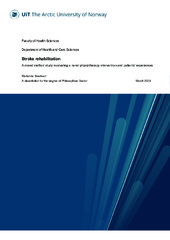| dc.contributor.advisor | Normann, Britt | |
| dc.contributor.author | Sivertsen, Marianne | |
| dc.date.accessioned | 2023-05-15T12:34:54Z | |
| dc.date.available | 2023-05-15T12:34:54Z | |
| dc.date.issued | 2023-06-15 | |
| dc.description.abstract | In this thesis, the possible benefits and challenges regarding taking part in a comprehensive individualized physiotherapy intervention, called I-CoreDIST and usual care physiotherapy following an acute stroke, along with patient perceptions of participation along the rehabilitation continuum are addressed. This is a mixed method study consisting of a randomised controlled trial (RCT) and an in-depth interview study.
Sixty participants with acute strokes were recruited for the RCT and randomised into receiving I-CoreDIST or usual care physiotherapy for 12 weeks in equal doses. Assessments of postural control, levels of physical activity, balance gait and health related quality of life were undertaken at baseline and at 12 weeks post inclusion. Between- and within-group effects were calculated. From the full sample, 19 participants were purposely selected for interviews. The interviews were transcribed and analysed using systematic text condensation. The findings from the quantitative and qualitative analysis were integrated through extracting the main findings and identifying common themes, divergences, and inconsistencies. In doing so we aimed to highlight aspects related to the overall aim of the study that either study could not have alone. The analysis was informed by the International Classification of Functioning, Disability and Health framework and enactive theory.
There were no differences between groups in term of effect of I-CoreDIST or usual care physiotherapy except for significant gains in health-related quality of life in the usual care group. The integrated findings show improvements in postural control, balance and gait that align with experiences of becoming able, indicating that partaking in 12 weeks of intensive physiotherapy was beneficial regardless of group allocation. Variations in organisational structures and cultures shape opportunities for active patient participation in post-stroke rehabilitation. Meaning and motivation is connected to experiencing bodily changes and tailored treatment. Sustained inactivity despite functional improvements is a challenge in long-term care. | en_US |
| dc.description.doctoraltype | ph.d. | en_US |
| dc.description.popularabstract | Physiotherapy is important in rehabilitation after a stroke. In this study we evaluated the possible benefits and challenges of taking part in a novel type of physiotherapy, I-CoreDIST and usual care physiotherapy along with perceptions of participation in rehabilitation from the user perspective. Sixty participants agreed to participate and were randomly divided into two groups receiving either I-CoreDIST or usual care physiotherapy in equal doses in the first 12 weeks after a stroke. We interviewed 19 participants. Our findings highlight the importance of thorough evaluation of disability early after a stroke. Improvements were detected in balance and walking in both groups at 12 weeks. Cultures and traditions in health care vary with regards to the degree of patient involvement in decision-making. Experiencing progress and individualized treatment is important for meaning and motivation. Sustained inactivity even following functional improvements is a challenge in post-stroke care. | en_US |
| dc.description.sponsorship | Helse Nord | en_US |
| dc.identifier.uri | https://hdl.handle.net/10037/29213 | |
| dc.language.iso | eng | en_US |
| dc.publisher | UiT The Arctic University of Norway | en_US |
| dc.publisher | UiT Norges arktiske universitet | en_US |
| dc.relation.haspart | <p>Paper I: Sivertsen, M., Arntzen, E.C., Alstadhaug, K.B. & Normann, B. (2022). Effect of innovative vs. usual care physical therapy in subacute rehabilitation after stroke. A multicenter randomized controlled trial. <i>Frontiers in Rehabilitation Sciences, 3</i>, 987601. Also available in Munin at <a href=https://hdl.handle.net/10037/26917>https://hdl.handle.net/10037/26917</a>.
<p>Paper II: Sivertsen, M., De Jaegher, H., Alstadhaug, K.B., Arntzen, E.C. & Normann, B. (2022). The precarity of patient participation - a qualitative interview study of experiences from the acute stroke and rehabilitation journey. <i>Physiotherapy Theory and Practice</i>, advance online publication. Also available in Munin at <a href=https://hdl.handle.net/10037/27853>https://hdl.handle.net/10037/27853</a>.
<p>Paper III: Sivertsen, M., De Jaegher, H., Arntzen, E.C., Alstadhaug, K.B. & Normann, B. (2022). Embodiment, tailoring, and trust are important for co-construction of meaning in physiotherapy after stroke: A qualitative study. <i>Physiotherapy Research International, 27</i>(3), e1948. Also available in Munin at <a href=https://hdl.handle.net/10037/27677>https://hdl.handle.net/10037/27677</a>. | en_US |
| dc.rights.accessRights | openAccess | en_US |
| dc.rights.holder | Copyright 2023 The Author(s) | |
| dc.rights.uri | https://creativecommons.org/licenses/by-nc-sa/4.0 | en_US |
| dc.rights | Attribution-NonCommercial-ShareAlike 4.0 International (CC BY-NC-SA 4.0) | en_US |
| dc.subject | VDP::Medisinske Fag: 700::Helsefag: 800 | en_US |
| dc.subject | VDP::Medical disciplines: 700::Health sciences: 800 | en_US |
| dc.subject | VDP::Medisinske Fag: 700::Helsefag: 800::Fysioterapi: 807 | en_US |
| dc.subject | VDP::Medical disciplines: 700::Health sciences: 800::Physiotherapy: 807 | en_US |
| dc.title | Stroke rehabilitation. A mixed method study evaluating a novel physiotherapy intervention and patients’ experiences | en_US |
| dc.type | Doctoral thesis | en_US |
| dc.type | Doktorgradsavhandling | en_US |


 English
English norsk
norsk
